These images can be verified by being shown to contain real people, identified as the missing relatives of a number of overseas Uyghurs approached by the BBC © BBC
In an article in France’s Le Figaro newspaper French Socialist MEP Raphaël Glucksmann used the words of Emile Zola when he accused the leaders of the Chinese Communist Party of the most serious crimes against humanity the 21st century has seen in its approach to China’s much-persecuted Uyghur people: genocide and human slavery. He also denounced the international community for letting it happen, through its silence and passivity. He had harsh words for others, too, including the leaders of a number of Muslim countries. In a speech Glucksmann gave in Brussels, he told his audience: “I blame the leaders of many Muslim countries, from Pakistan to Saudi Arabia, who on the one hand brandish their faith as a standard and on the other support China’s policy of destroying mosques.” Some argue that the tide is starting to turn, but if so, it’s doing so very slowly indeed. Too slowly, in fact.
It has led to high tension between China and Glucksmann himself. So who is Raphaël Glucksman? He’s an essayist, film-maker and Socialist politician, and he’s had an interestingly diverse career, serving as an advisor to the President of Georgia, Mikhail Saakachvili, for three years from 2009. He then became a journalist, writing features for France Inter and later Alternative Libérale until his political convictions moved to the left, at which point he launched Place Publique, a left-leaning Liberal party. Glucksmann has become something of a thorn in Beijing’s side, constantly reminding the world of China’s forced labour camps and the severe mistreatment of the Uyghur people. China, of course, denies any wrongdoing, describing the camps as “re-education facilities” but Glucksmann isn’t accepting that. Why does it matter to him so much? Because of his commitment to defending human rights, we must assume. There is plenty to defend against some dreadful threats.
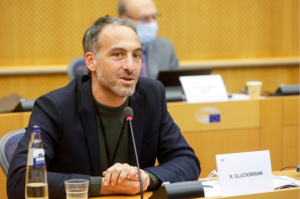
He really entered the European political scene in 2018, when he founded his new political party, Place Publique (It means “Public Square”, the place where politicians of an earlier age tried to sell their ideas to the voters). The following year, Place Publique presented a joint list, together with the French Socialist Party, for the European Parliamentary elections with the slogan: “Envie d’Europe, écologique et sociale” (“The desire for Europe, ecological and social”). They gained 6.2% of the votes cast, earning them six seats in the new Parliament. Glucksmann was selected for the Committee on Foreign Affairs. It was an ideal place from which to launch his campaign on behalf of the Uyghur people. When a new committee was created called the “Special Committee on Foreign Interference in all Democratic Processes in the European Union, including Disinformation”, Glucksmann was selected to chair it. In addition, he has been chairing the Responsible Business Conduct Working Group, providing him with a good platform from which to urge better conduct from businesses using or importing goods from Xianjing. He is also involved with the Spinelli Group, an in-house group seeking to convert the European Parliament to federalism. It was set up in 2010 by the former leader of the Alliance of Liberals and Democrats, Guy Verhofstadt. Glucksmann has concentrated his fire on China’s supposed “re-education camps” for the Uyghurs of Xinjiang. As a result, he has been sanctioned by China’s Ministry of Foreign Affairs.
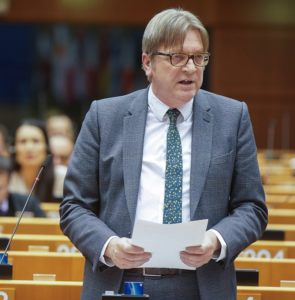
In case you may get the idea that he’s a “one-subject politician”, Glucksmann has also taken an interest in Green issues. In May 2021, Glucksmann joined a group of 39 mostly Green Party MEPs who sent a letter to the leaders of Germany, France and Italy, urging them not to support Arctic LNG 2, a $21-billion (€20.45-billion) Russian Arctic liquefied natural gas (LNG) project, because of fears over climate change. In addition, in November 2021, Glucksmann led a group of seven Members of the European Parliament to Taiwan as a way of sending a strong signal in support of the island and its continuing independent status, despite threats of Chinese retaliation.
It was as leader of his new political party that he was elected to the European Parliament in 2019. Born in 1979, he’s also a film maker, so potentially quite influential. He joined the European Parliament sub-committee on human rights, where he took a keen interest in the fate of the Uyghur people, who were being moved from their homeland and placed in internment camps, under the constant scrutiny of surveillance cameras and guards, and where they were forced to work on Chinese government projects. China denies it was forced labour but there’s really no other way to describe it. Families were being broken up, it’s been claimed, women were sterilized and children were simply disappearing. There was a lot of pro-Chinese propaganda emanating from Beijing, too, which they were compelled to view in their endless “classes”. What was so wrong with the Uyghurs in China’s eyes? They were insufficiently “Chinese”, it seems. Glucksman took up the batons on the Uyghurs’ behalf because, it seemed, no-one else was doing so.
In China’s case, it was all about one thing: pure and simple racism. It still is, it appears. When Émile Zola wrote his famous open letter to the then President of France, Félix Faure, it was to point out that Alfred Dreyfus had been accused of treason simply because he was Jewish.
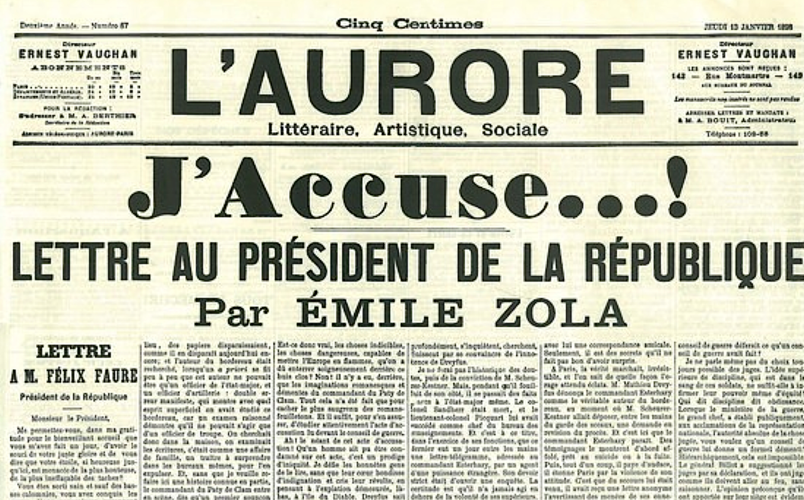
It was published in L’Aurore in 1898 but Zola himself was arrested as a consequence, fleeing to England to avoid prison. Again, it was racism, the monster that refuses to die, just as it was racism that lay behind a Chinese decision to arrest almost 17,000 people, including university professors, writers, musicians and doctors on charges that, according to Nury Turkel in his terrifying book, No Escape, included “having a long beard”, “reciting the Koran during a funeral” and even “using the front door more often than the back door”. If that’s a crime, I plead guilty, m’lord: I would have to climb over my garden fence to use the back one, and I’m not sure I could. It’s hard to imagine how anyone could rate “wearing a beard” as a greater offence than imprisoning people and forcing them to do unpaid work, but anyone criticising China is accused of “interfering” in its internal affairs.
The fact is that the manufacture of several Western clothing brands appears to involve the hard work of Uyghur people who have no choice about it. “Brands bring crime against humanity into our lives,” Glucksmann said in his support of a complaint lodged in Paris against international clothing companies that have been accused of benefitting from China’s policy of providing forced labour. Glucksmann was speaking at a press conference of the NGOs who launched the complaint, united in a kind of anti-corruption group, plus another anti-corruption organisation, Sherpa, and the Uyghur Institute of Europe. Sherpa, with its skeleton staff of two lawyers and a bunch of volunteers, and with extremely limited funding, mainly provided by the New York-based Open Society Justice Initiative, is currently pursuing the French bank BNP Paribas and the Lafarge Holcim concrete company (also French) for alleged corruption.
The issue with the Uyghurs is further complicated by the United States wanting to retain China as an ally on the Security Council because of its own problems with terrorists and its often-clumsy handling of international affairs. As for the Uyghur labour camps, these are denied by Beijing, which insists they’re part of a programme of ‘vocational training centres’, set up to create distance between the Uyghurs themselves and those intent on supporting Islam and separatism, following various attacks that have been – rightly or wrongly – attributed to them.
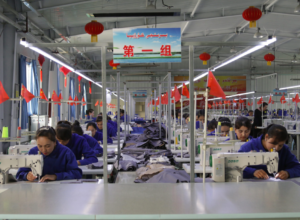
The various associations with which Glucksmann is associated, together with a Uyghur survivor of the camps, lodged the complaint with the Paris prosecutor’s office, accusing the Chinese authorities of “concealment of reduction in servitude” (whatever that means in other than legal terms), “concealment of trafficking in human beings” and, perhaps most ominously, of “concealment of genocide”. The request for an official investigation of the various accusations was made against a French company (but with strong Japanese connections) because of links with manufacturers the campaigners think may (and may not, of course) have used forced labour, such as Zara, Bershka and including firms like Skechers. Britain is said to have been especially keen to import products from Xinjiang in recent months: Between 2019 and 2020, imports to Britain from Xinjiang rose by 192%, despite concerns that had been raised over forced labour. Beijing sees criticisms of its labour policies as “interfering in China’s internal affairs”, seemingly without spotting the irony of describing trade relations with the rest of the world as “internal”. Glucksmann sees this request for action by himself and his allies as “a crucial step” in support of the Uyghurs. Young people in France are responding by challenging the brands accused of being involved in modern slavery.
WHEN THEM COTTON FIELDS GET ROTTEN…
A lot of the cotton that goes into such popular garments as T-shirts comes from forced Uyghur labour. It’s the first time, it has been pointed out, that American citizens have worn cotton products that are the product of slavery since the deep American south produced it in antebellum America.
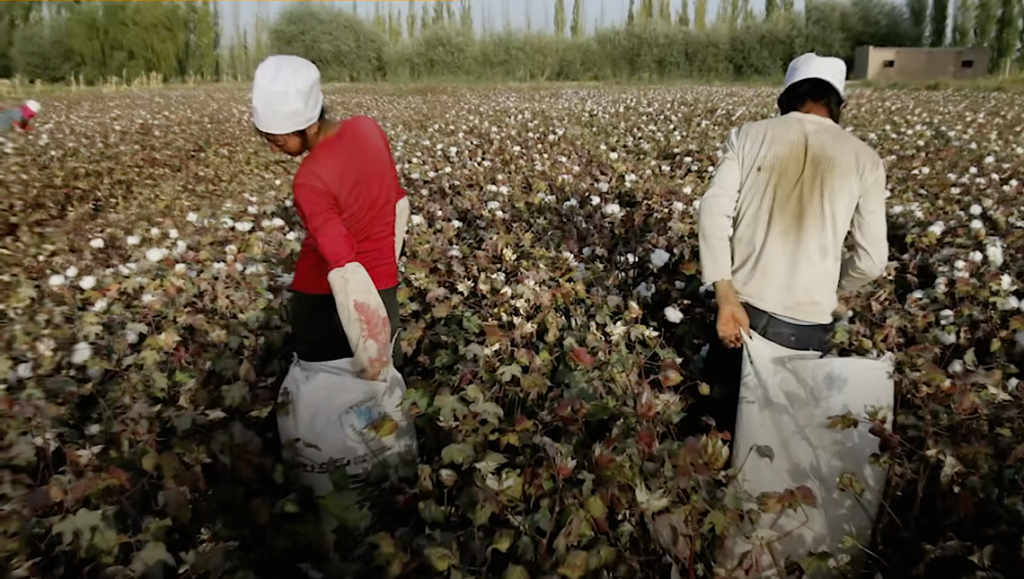
It’s been claimed that as much as 20% of all cotton products on the market during the American civil war (1861-18965) were produced by slave labour, almost all of it provided by African slaves. Union Army soldiers put an end to it back then, when the Civil War ended (some Trump supporters have bemoaned the Union victory on-line but have not yet tried to use the Trump trick of claiming the Confederacy were the real winners but that they had been cheated of victory in some mysterious way), but that’s not what’s happening in China.
There, Uyghurs are forced to work, their children are separated from them forcibly and many Uyghur women have been sterilised to prevent further reproduction. When the writer George Orwell wrote 1984 (back in 1948) he had no idea how awful the reality of total subjugation could become. The existence of the Internet has made it much, much easier for tyrannical regimes to exercise total control.
Let’s take a look at Xinjiang, the Uyghur homeland, although it’s not what the Uyghurs themselves call it. For them it will always be East Turkistan, but the Han Chinese call it Xinjiang (which apparently means “old land now returned”), so, for the sake of argument, I shall do the same. Some 11-million people live there and their Chinese rulers say they’re “not sufficiently Chinese”. They may have an ancient culture with ancient traditions, their own religious faith, language, and literature, but Beijing portrays them all as Al Qaeda terrorists. Extra-judicial arrests are commonplace, based on race, ethnicity and religion, just like the arrests of Jews and Roma in Hitler’s Germany. The terrorist attacks of 9/11 have served the Chinese government’s purposes well, tarring all the Uyghurs with the same “anti-Chinese terrorist” brush. The system is likely to continue because it’s good for China’s economy, in which cotton is described as “white gold”; it’s of enormous value, even if other natural resources are also in ample supply.

Paying its workers would presumably impact on the profits. In Britain and other parts of the world, pressure groups are active (arguably not active enough) in trying to get governments to impose a ban on imports in any way linked with forced labour. As for Xinjiang itself, it’s a landlocked “autonomous” region in the North West of China that is able to exercise very little true autonomy. Its capital is Ürümqi but in reality it is wholly run from and for Beijing. It’s a big place, covering almost 1.7-million square kilometres and with a with a history stretching back some 2,500 years, East Turkestan is a long-established entity. However, its rich resources of oil, minerals and especially natural gas make it extremely valuable to Beijing, which is why the Chinese government is so determined to come down hard on suspected separatists. That’s why Glucksmann is taking such a strong interest in the injustices being meted out there.
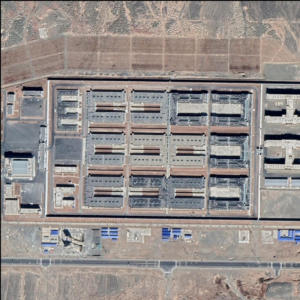
Politicians in the West are increasingly speaking out against the treatment of the Uyghurs, with Raphaël Glucksmann at the forefront, earning him a mention in Nury Turkel’s book, “No Escape”. Glucksmann wrote on the Archyde website: “It is the largest mass internment in the world today. Uyghurs are deported, not for what they do, but for who they are. The Chinese regime is eradicating an identity and enslaving millions of human beings, transforming them into organ banks, in fact “human material”, as Stalin said. So, yes, that falls within the international criteria to qualify as genocide, with, in particular, the systematic sterilization of women, instrument of disappearance of a people. It is the current crime against humanity that comes closest to the genocides perpetrated in the mid-twentieth century. It takes place in deafening silence.” So did Hitler’s attempted eradication of Jews and Roma back in the 1930s. It wasn’t for them that Britain went to war with Germany.
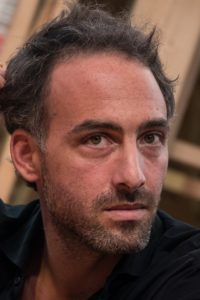
Why does the rest of the world stay mute in the face of such horrors? Glucksmann says it’s because of fear of Chinese power and through indifference. People don’t know enough or care enough about the Uyghurs to do anything (or even say anything) about it. “European leaders have not had a word to condemn this crime since 2016. Nor have the leaders of Muslim countries, while the Uyghurs are targeted as Muslims: wishing a ‘good Eid’ or reading the Koran is enough to get them deported. This silence kills.” Ask the many thousands of victims of Auschwitz, Bergen-Belsen, Dachau and Buchenwald. But you can’t, of course, Hitler’s brutal policies killed most of them.
Glucksmann and others try tirelessly to raise and maintain awareness of what China is doing to the Uyghurs. Whatever Xi Jinping may say (and hope), the issue is not about to go away. The European Parliament has adopted a resolution saying that what China is doing to the mostly Muslim, Turkic-speaking indigenous ethnic groups, like Uyghurs, Kazakhs, and others in the Xinjiang region, amounts to “crimes against humanity” and holds a “serious risk of genocide.” One of those drafting this resolution was Glucksmann and it was approved in a vote at the European Parliament on June 9, 2022. The resolution condemned “in the strongest possible terms” China’s treatment of the Uyghur peoples and other indigenous groups in the northwestern region. But it’s only words, of course, as Shakespeare said in his little-performed play, Troilus and Cressida: “Words pay no debts. Give her deeds: but she’ll bereave you o’ the deeds, too, if she call your activity in question.”
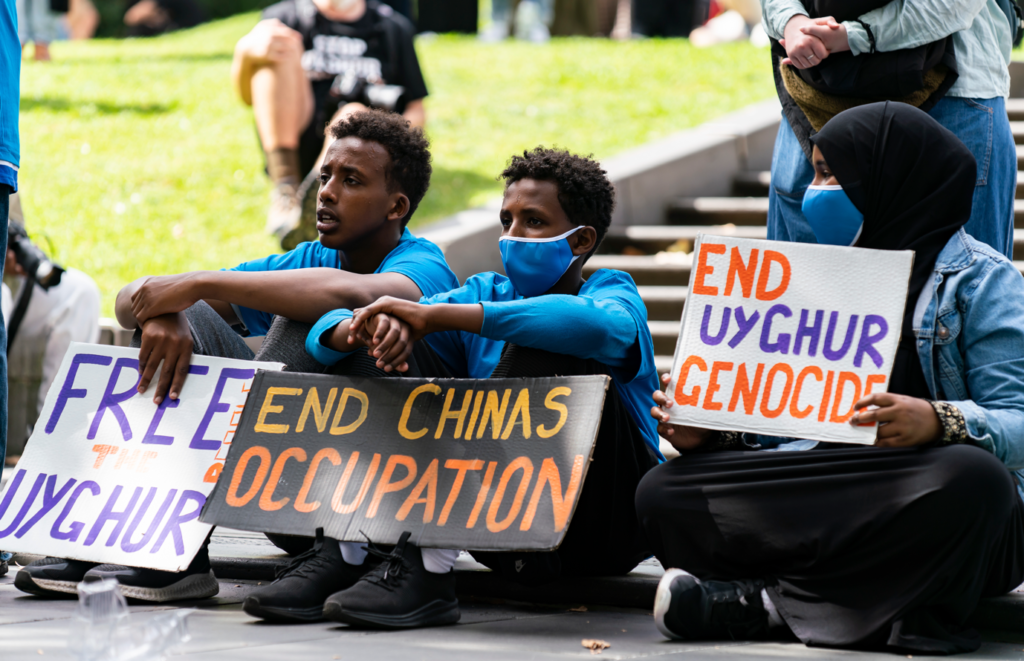
Where attitudes to trading in the very goods produced by China’s Muslim slave-labour seem ambivalent at best, it would be true indeed to point out that: “Talk is cheap.” China has even built crematoria to destroy the evidence of their crimes when one of their “students” (for which read ‘prisoners’) dies. The last time I saw the results of such things was as Auschwitz. The human race never learns, especially where profit is involved. It’s hard to see how Xi Jinping can square his actions against the Uyghur people with the precepts of Marxism, in which all people are equal. The human race has known that inequality is not right for a very long time. It was the Greek philosopher Herodotus who said: “It is clear that not in one thing alone, but in many ways equality and freedom of speech are a good thing.” Try convincing Xi Jinping of that.
THE BUCK STOPS HERE…OR MAYBE THERE?
The issue has certainly stirred up the policy-makers of the EU. It’s a question of whether or not the EU will pass legislation imposing a complete trade ban, something the United States has already done. Ironically, it was when he was in the White House that Donald Trump imposed the first ban. The EU could choose to go for a weaker measure instead, imposing greater “due diligence” rules on companies, shifting the onus for compliance onto the companies engaged in the commerce. It would mean more bureaucracy and more work for companies trading with China but it would ease the burden on EU officials and customs officers. Raphaël Glucksmann has been running a social media campaign in favour of an import ban for goods from Xinjiang and claims that the ban cannot be squeezed into the new up-coming due diligence rules. He wants a separate far-reaching trade law that would be policed by the EU’s Trade Commissioner, Valdis Dombrovskis.
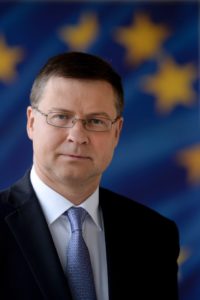
“I know the existing discussion in the Commission,” he told Politico magazine, “And I cannot say strongly enough how opposed I am to the idea of adding the ban to the due diligence directive. It would postpone the enforcement of the ban and make the due diligence directive more complicated than it is already.” Glucksmann explained to the magazine why he is so strongly opposed to the idea: “Due diligence focuses on companies; the ban focuses on products and has to be enforced as a trade regulation. Commissioner Dombrovskis should take the lead and act quickly.” Glucksmann has made it clear before that what is needed, in his view, is tough, unyielding and unambivalent legislation, policed by customs officers and police.
The Uyghur people have expressed their gratitude to Glucksmann for his work in bringing the issue to public attention. “Mr. Glucksmann’s efforts as an MEP in the European Parliament have been crucial to advance the agenda to promote Uyghur human rights in the European Union, and amplify Uyghur voices,” the World Uyghur Congress told me. “His work has been particularly impactful with regards to Uyghur forced labour. Mr. Glucksmann has been a driving force behind mandatory EU human rights due diligence legislation, as well as the upcoming EU mechanism to ban the imports of forced labour products.” The Congress credited Glucksmann with making a serious difference to public attitudes. “Due to his efforts, the EP has always taken a very strong stance on these issues. On a national level in France as well, Mr. Glucksmann has made a real impact by informing his large following on social media, and creating a grassroots movement to campaign for Uyghur rights. The Uyghur people are beyond grateful for Mr. Glucksmann’s support.” So say the World Uyghur Congress; Commissioner Dombrovskis seems less enthusiastic. His department has a reputation for being more “pro-Chinese” than others. Up to now, at least. His department is even said to have chosen to ignore reports of mass sterilizations in Xinjiang to secure an investment agreement with Beijing.
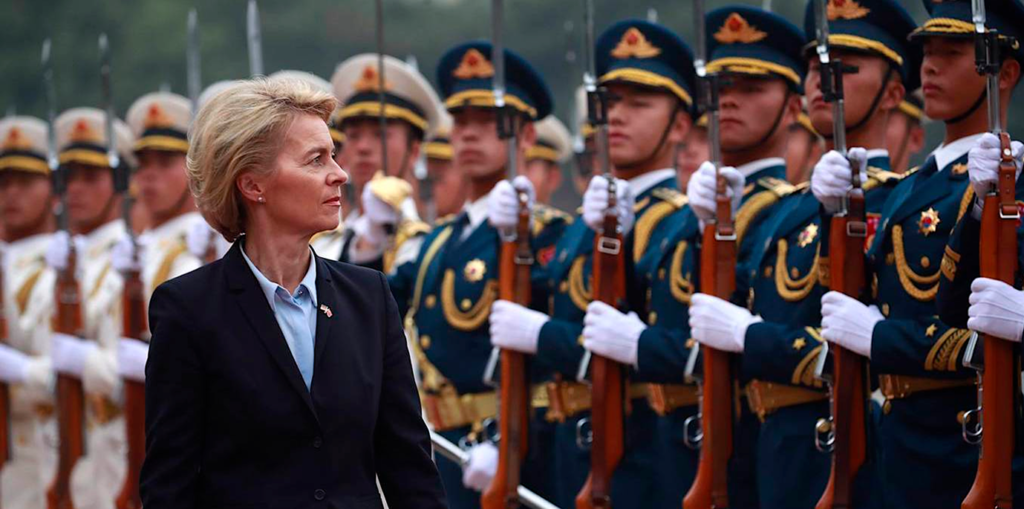
Commission President Ursula von der Leyen would like to ban goods made by forced labour but nobody seems clear as to who should impose such a ban. A total ban would mean that the EU was following in the footsteps of the United States. The “due diligence” measures would shift responsibility onto commercial companies. It also shifts the focus onto individual companies operating individual trade deals, as opposed an all-out ban. The system proposed would mean that some items produced by forced labour could still find their way into the supply chain unnoticed. In the old French expression, one needs to have “le courage de son opinion” – the courage of one’s convictions. It’s not easy when other people’s jobs and businesses may depend on the outcome.
Glucksmann has said that the reason so few people are aware of China’s actions in Xinjiang is that they (understandably, perhaps) fear China’s power: don’t pick on the bully in the school playground because he’s bigger, tougher and more ruthless than you are, and you might get hurt. In China’s case, that most probably means “hurt in the pocket”. Vogue Business reported that: “For Raphaël Glucksmann, vice-chair of the Subcommittee on Human Rights of the European Parliament (or DROI Committee), the only solution is to hold companies legally responsible for any form of violation of human rights in their value chain, including violations perpetrated by their suppliers, subsidiaries and subsidiary contractors.” The article went on to say: “Eighty-two well-known international brands, including Adidas, Lacoste, Nike and Zara, were linked, directly and indirectly, to Chinese factories that allegedly used forced labour earlier this year. The Australian Strategic Policy Institute report alleged 80,000 Uighurs had been deported to work in factories in the last two years “under conditions that strongly suggest forced labour”.
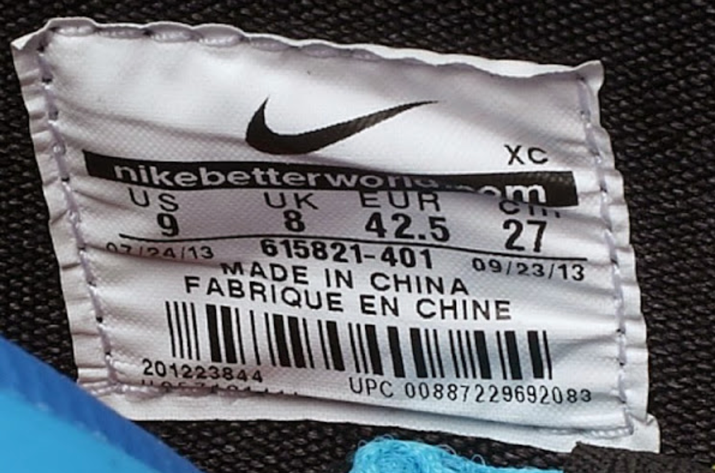
PROFIT, LOSS, AND INTERNMENT
Vogue Business, itself linked to the fashion industry but keen to ‘clean it up’, also contacted other big names. “Of the brands that responded to a request for comment, Gap, H&M, Ralph Lauren and Uniqlo denied sourcing garments from or working with manufacturers in Xinjiang,” it reported. “A&F Co. says it believes it does not work with any factories listed in the report. Nike said it does not source products or components directly from Xinjiang and doesn’t use textiles or spun yarn from the region. Cerruti 1881 said it has never used the Uyghur minority forced labour directly or indirectly. ‘L Brands’ said it cut ties with one supplier in Xinjiang earlier this year. PVH said that since January 2019 the company and its licensees are prohibited from producing finished goods in the region. Jack & Jones is increasing focus on due diligence procedures in tier 3 and 4 production in the province. Lacoste said specialist auditing firms found no non-compliance among its suppliers in China. Puma said that only one of the two manufacturers associated with the company by the report works, indirectly, for Puma and there is no evidence of any form of forced labour in its factory. Zara said it does not have commercial relations with any factory in Xinjiang. Zegna said none of the companies named in the report is a supplier to Zegna, but that one of the companies purchases fabrics from them. Adidas, Fila, Li-Ning and Skechers didn’t reply to a request for comment at the time of publication.” However, in Nury Turkel’s book, “top brands such as Adidas, H&M and Nike have been identified as having used cotton from Xinjiang”, according to a report called “Global supply chains, forced labour and the Xinjiang Uyghur Autonomous Region”, presented to the Congressional Executive Committee on China in a report from March, 2020.
Glucksmann is now working on a legislative initiative to make human rights and environmental due diligence mandatory for companies throughout their entire supply chain, based on a duty of care, “which is a legal obligation,” says the report, “to adhere to a standard of reasonable care. In effect, a European parent company will be legally liable for failure of due diligence not only in its owned operations, but on all levels of the supply chain beyond first-tier suppliers and no matter where they are in the world. While details are still sketchy, the legislation could also require the burden of proof in reverse (which means that the defendant will have to prove its innocence as opposed to the prosecutor having to prove their culpability) and address all human rights, not only severe violations. American companies that don’t comply will be taxed.”
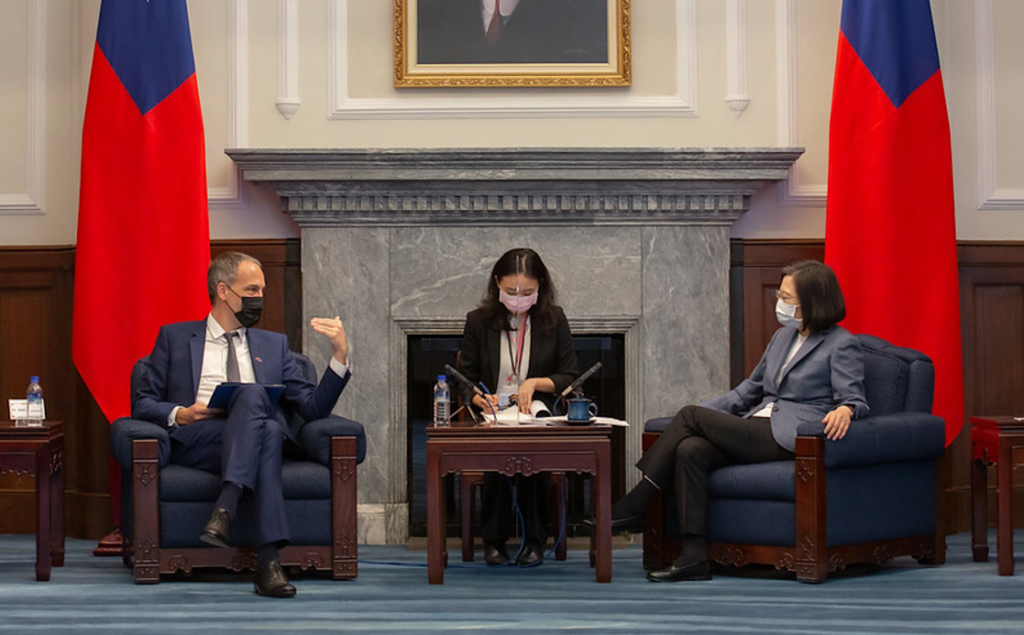
All of this doesn’t necessarily make Glucksmann popular everywhere. He has had his election poster from May of this year defaced with anti-Semitic slogans, writing the word “Jew” on his forehead and defacing his picture. Glucksmann said he wanted to go on fighting this kind of brainless hatred, although he admitted that he didn’t expect it ever to disappear completely. “Regardless of the minority that the perpetrators intend to attack, we will never lower our heads and we will continue to persecute the hatred,” he wrote, without specifying in which city or even when the posters were discovered. We appear to be stuck with the kind of people who simply enjpoy hating others. Glucksmann clearly isn’t racist or stupid, which is partly why he found his name on a Chinese list of people they’ve sanctioned. With the Beijing regime, no arguing nor disagreement is permitted.
It’s a somewhat bizarre and arcane list that probably only makes much sense to members of the Chinese government, who are notoriously inscrutable. The sanctions were in direct response to a similar action by the EU over the alleged human rights abuses in the Xinjiang region. It’s the first time that the EU has sanctioned the People’s Republic in more than thirty years. The measures Brussels has imposed are primarily aimed at four Chinese officials and one entity, who it accuses of human rights violations of the Uyghur minority, including arbitrary detentions, torture and forced political indoctrination, almost always in one of the concentration camps China has erected to hold its Uyghur prisoners (it still calls them “training camps”). Needless to say, China fervently denies the allegations. “This move, based on nothing but lies and disinformation,” China’s foreign ministry said after the EU sanctions were announced, “disregards and distorts facts, grossly interferes in China’s internal affairs, flagrantly breaches international law and basic norms governing international relations, and severely undermines China-EU relations.” That may well be true, but it appears to be unavoidable. Other countries must simply toe Beijing’s line to keep in with China but Xi Jinping can hardly act surprised when that doesn’t work. Oh, and I fail to see how it “breaches international law”, too.
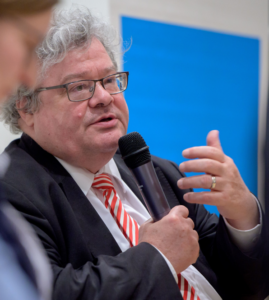
As for those named by Beijing for ‘punishment’, they were five members of the European Parliament. In addition to Raphaël Glucksmann, who chairs the parliament’s special committee on foreign interference in democratic processes, there were also: Reinhard Bütikofer (Germany, Greens), currently the chair of the parliament’s delegation for relations with China; Michael Gahler (Germany, EPP), who acts as the spokesman of the European People Party (EPP) on foreign affairs; and Ilhan Kyuchyuk (Bulgaria, Renew Europe) and Miriam Lexmann (Slovakia, EPP) who are both members of the foreign affairs committee.
Three members of national parliaments were also singled out: Sjoerd Wiemer Sjoerdsma of the Dutch Parliament, Samuel Cogolati of the Belgian Federal Parliament and Dovile Sakaliene of the Seimas of the Republic of Lithuania. What they all have in common is that they have had a part in resolutions in which the situation in Xinjiang was described as “genocide”; not a word that finds favour in Beijing. Additionally, the students Adrian Zenz, from Germany, and Björn Jerdén, from Sweden, who are specialising in China studies, were also named.
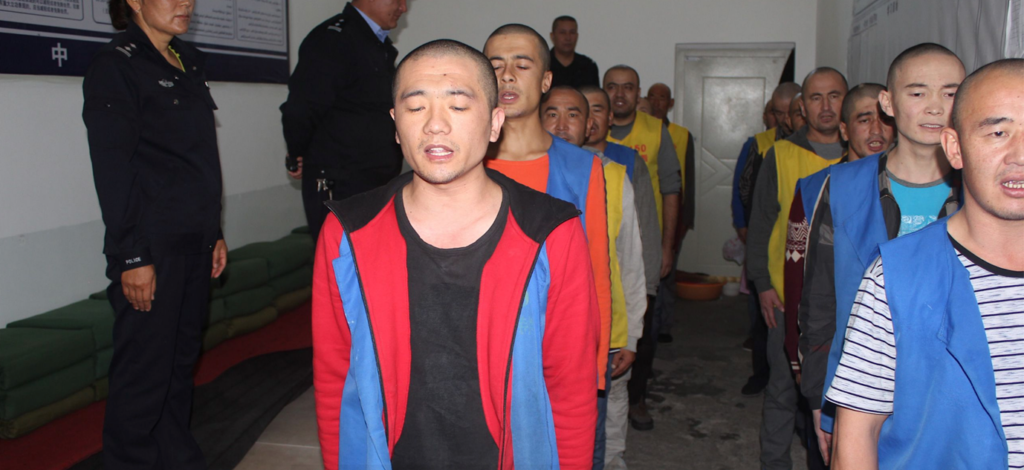
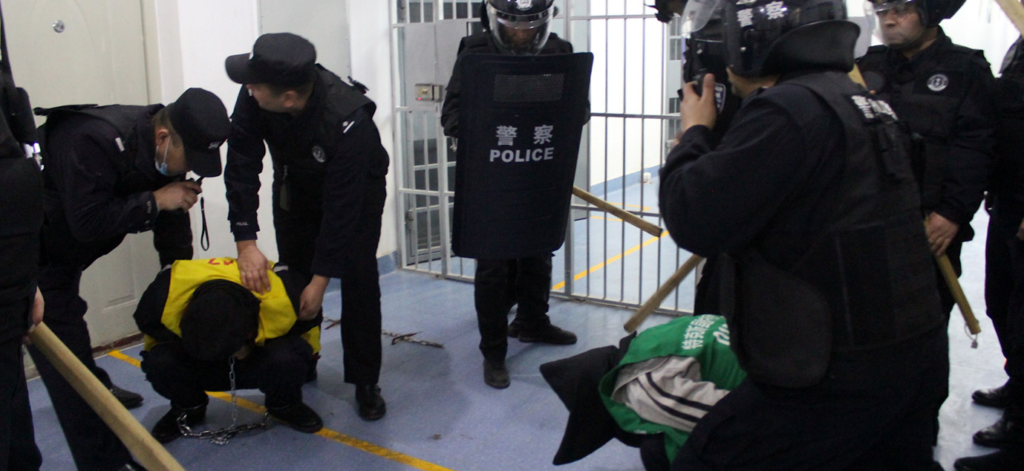
The European entities targeted by China are: the Political and Security Committee of the Council of the European Union, the Subcommittee on Human Rights of the European Parliament, the Mercator Institute for China Studies in Germany, and the Alliance of Democracies Foundation in Denmark. “The individuals concerned, and their families,” the Chinese ministry announced, “are prohibited from entering the mainland, Hong Kong and Macao of China. They and companies and institutions associated with them are also restricted from doing business with China,” the ministry said. In terms of retaliation, the EU went further than just Chinese figures and groups. In total, ministers listed 11 people and four entities allegedly responsible for serious human rights violations in China, North Korea, Libya, Russia, South Sudan and Eritrea. They also targeted 11 Myanmar officials.
BACK TO THE FUTURE
The last time the European Union imposed sanctions against China came after the vicious response to a harmless demonstration in Tiananmen Square, in which it’s believed some 10,000 were killed The new raft of measures is aimed at four Chinese officials and one entity believed to have been involved in alleged human rights violations of the Uyghur Muslim minority. The international community has for months alleged that serious abuses, such as mass arbitrary detention, torture and forced political indoctrination, are taking place in concentration camps located in the Xingjian autonomous region. The sanctions the EU placed on China were part of a package agreed unanimously by EU foreign affairs ministers at a meeting in Brussels. The meeting included an informal exchange with the United Nations High Commissioner for Human Rights, Michelle Bachelet, and specific debates on EU-Turkey relations and the Western Balkans.
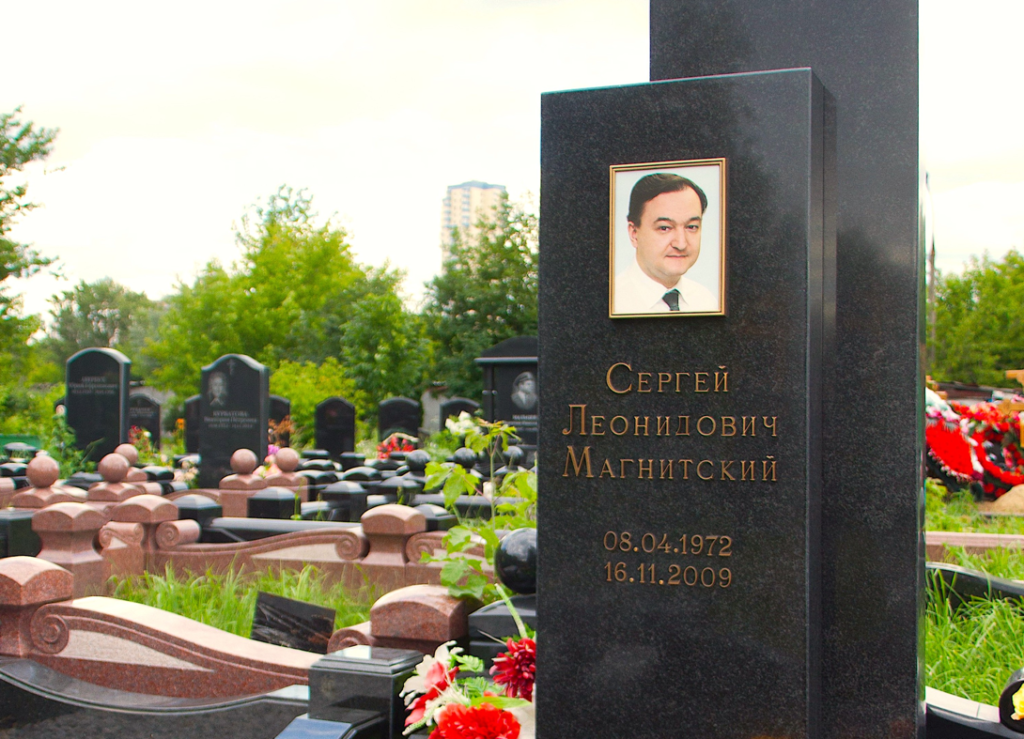
The measures became official shortly after they were published in the Official Journal of the European Union. They include a visa ban and an asset freeze in the EU, while people and entities inside the Union are prohibited from providing funds, directly or indirectly, to the named individuals. The penalties come from a new mechanism called the EU Magnitsky Act, which was adopted in December 2021 and has already been used to punish four senior Russian officials involved in legal proceedings against Russian opponent Alexei Navalny. In the case of China, EU ministers selected four individuals who, in their view, are directly involved in the alleged human rights violations taking place in Xinjiang.
Beijing seems to like to recategorize its actions according to what suits it at that moment. Truth and honesty have no place in China’s actions or opinions, of course. What was clearly an “international” affair one day can turn into an “internal” matter the next. Somebody must one day explain to Xi Jinping that the world doesn’t work that way. Perhaps Xi Jinping should recall an old Chinese proverb (there are thousands of them to choose from) as he tightens his noose around the people of Xinjiang: “The only thing that was missing at the rich man’s funeral was mourners.” Apart from his tame sycophants, who do you think would mourn him? Probably not, on balance, Raphaël Glucksmann.

